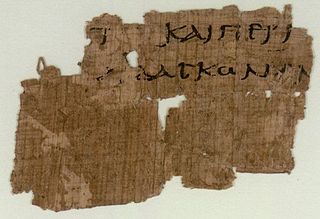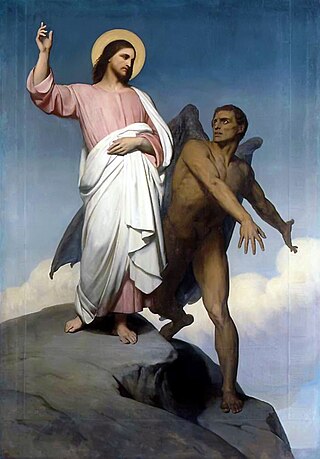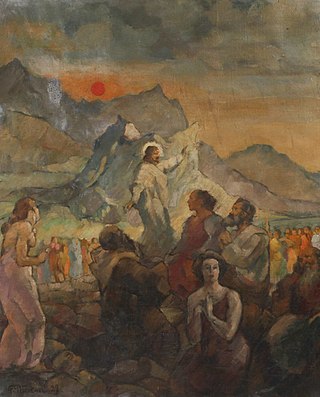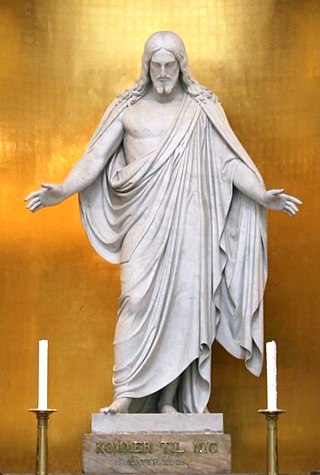
The Epistle to the Romans is the sixth book in the New Testament, and the longest of the thirteen Pauline epistles. Biblical scholars agree that it was composed by Paul the Apostle to explain that salvation is offered through the gospel of Jesus Christ.
The concept of the kingship of God appears in all Abrahamic religions, where in some cases the terms kingdom of God and kingdom of Heaven are also used. The notion of God's kingship goes back to the Hebrew Bible, which refers to "his kingdom" but does not include the term "Kingdom of God".

Matthew 4 is the fourth chapter of the Gospel of Matthew in the New Testament of Christian Bible. Many translations of the gospel and biblical commentaries separate the first section of chapter 4 from the remaining sections, which deal with Jesus' first public preaching and the gathering of his first disciples.

Matthew 4:9 is the ninth verse of the fourth chapter of the Gospel of Matthew in the New Testament. It is part of the Temptation of Christ narrative. Jesus has rebuffed two earlier temptations by Satan. In this verse, Satan offers control of the world to Jesus if he agrees to worship him.

Matthew 5 is the fifth chapter of the Gospel of Matthew in the New Testament. It contains the first portion of the Sermon on the Mount, the other portions of which are contained in chapters 6 and 7. Portions are similar to the Sermon on the Plain in Luke 6, but much of the material is found only in Matthew. It is one of the most discussed and analyzed chapters of the New Testament. Warren Kissinger reports that among early Christians, no chapter was more often cited by early scholars. The same is true in modern scholarship.

Matthew 5:15 and Matthew 5:16 are the fifteenth and sixteenth verses of the fifth chapter of the Gospel of Matthew in the New Testament. They are part of the Sermon on the Mount, and form one of a series of metaphors often seen as adding to the Beatitudes. Verse 14 compared the disciples to a city upon a hill which cannot be hidden. These verses present a similar analogy.

Matthew 5:18 is the eighteenth verse of the fifth chapter of the Gospel of Matthew in the New Testament and is part of the Sermon on the Mount. In the previous verse, Jesus has stated that he came not to destroy the law, but fulfill it. In this verse, this claim is reinforced.

Matthew 5:20 is the twentieth verse of the fifth chapter of the Gospel of Matthew in the New Testament and is part of the Sermon on the Mount. Jesus has reported that he came not to destroy the law, but fulfill it. But in this verse, he makes clear that the common understanding of the Law is not enough.

Matthew 5:33 is the thirty-third verse of the fifth chapter of the Gospel of Matthew in the New Testament and is part of the Sermon on the Mount. This verse is the opening of the fourth antithesis, beginning the discussion of oaths.

Matthew 5:35 and Matthew 5:36 are the thirty-fifth and thirty-sixth verses of the fifth chapter of the Gospel of Matthew in the New Testament. They are part of the Sermon on the Mount. These verses are part of either the third or fourth antithesis, the discussion of oaths. Jesus tells his listeners in Matthew 5:34 "to not swear oaths" and in here presents examples of swearing oaths. In context, this passage refers not to the modern understanding of cursing or using foul language, but rather, the act of swearing oaths and making promises.

Matthew 5:37 is the thirty-seventh verse of the fifth chapter of the Gospel of Matthew in the New Testament and is part of the Sermon on the Mount. This verse is part of either the third or fourth antithesis, the final part of the discussion of oaths.

Matthew 5:39 is the thirty-ninth verse of the fifth chapter of the Gospel of Matthew in the New Testament and is part of the Sermon on the Mount. This is the second verse of the antithesis on the command: "eye for an eye". In one of the most famous verses in the New Testament, Jesus here rejects revenge and retaliation, instead telling his followers to turn the other cheek.

Matthew 6:33 is the thirty-third verse of the sixth chapter of the Gospel of Matthew in the New Testament and is part of the Sermon on the Mount. This verse continues the discussion of worry about material provisions.

Matthew 28 is the twenty-eighth and final chapter of the Gospel of Matthew in the New Testament. This chapter records that Jesus is risen, describes the actions of the first witnesses to this event, and ends with the Great Commission.

Matthew 7:11 is the eleventh verse of the seventh chapter of the Gospel of Matthew in the New Testament and is part of the Sermon on the Mount. This verse summarizes the preceding metaphors in favour of prayer.

Matthew 7:21 is the twenty-first verse of the seventh chapter of the Gospel of Matthew in the New Testament and is part of the Sermon on the Mount. This verse continues Jesus' warning against false prophets.
Matthew 11:25 is the 25th verse in the eleventh chapter of the Gospel of Matthew in the New Testament.

"Thou shalt not take the name of the LORD thy God in vain" is the second or third of God's Ten Commandments to man in Judaism and Christianity.

The love of Christ is a central element of Christian belief and theology. It refers to the love of Jesus Christ for humanity, the love of Christians for Christ, and the love of Christians for others. These aspects are distinct in Christian teachings—the love for Christ is a reflection of His love for all people.
Kingdom of heaven is a phrase used in the Gospel of Matthew. It is generally seen as equivalent to the phrase "kingdom of God" in the Gospel of Mark and the Gospel of Luke. Thought to be the main content of Jesus's preaching in the Gospel of Matthew, the "kingdom of heaven" described "a process, a course of events, whereby God begins to govern or to act as king or Lord, an action, therefore, by which God manifests his being-God in the world of men."

















